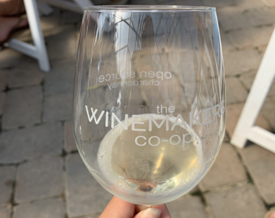Believe it or not, every state in this country grows grapes and makes wine. In my home state of New Jersey there are over 50 wineries, with quite a few of those within easy driving distance of me. However, the last time I actually tasted a New Jersey wine was at least 10 years ago. At that time, NJ tasting rooms were filled with syrupy sweet bottles of blueberry wine, raspberry wine and other similarly flavored sugary concoctions. After that experience, I wrote off New Jersey as a state entirely unable to produce quality wines. However, I can admit when I am wrong.
This past weekend I decided to attend a local Fall Portfolio Tasting event held by The Winemakers Co-Op, a group of local wineries that have come together to research, educate and ultimately improve the NJ wine industry. The co-op includes Beneduce Vineyards in Pittstown, Hawk Haven Vineyard & Winery in Rio Grand, Working Dog Winery in East Windsor, Unionville Vineyards in Ringoes and William Heritage Winery in Mullica Hill. It was the perfect opportunity to taste and learn more about wines from a variety of local producers in one place. What I found entirely changed my perception of NJ wines.
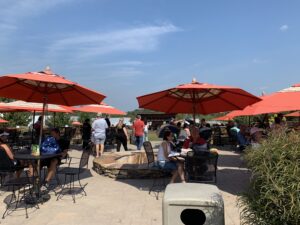
In the last decade, a lot has evolved in NJ vineyards and wineries. Rather than turning out predominently sweet berry wines, producers are creating interesting, yet approachable styles from grape varieties like Viognier, Chenin Blanc, Gewurztraminer, Albariño, Roussanne and Marsanne, as well as popular international varietals including Cabernet Sauvignon, Pinot Noir and Chardonnay. There is also no fear of experimentation, with several wineries producing funky, natural wines that are rustic and textured.
During the VIP session with the winemakers prior to the general admission tasting event, there was significant discussion about the current harvest as well as environmental sustainability in the vineyards. The winemakers are currently in the process of harvesting the 2019 vintage, and it is promising to be the best vintage in memory.
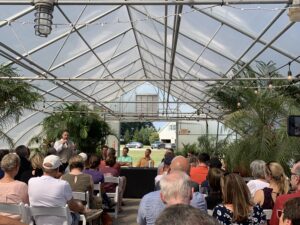
This past season began with its share of challenges. Todd Wuerker, Winemaker at Hawk Haven Vineyard, described it as a “tale of two weather patterns.” Frost damage in early Spring caused crop loss, with Beneduce losing almost 30% of their yield. Then the Spring weather turned wet and vine growth was rampant. Additional workers had to be hired to manage the canopy, keeping the vines in check and pruned back. Too much green growth means the vine diverts resources to growing leaves instead of grapes.
Then summer hit and settled into an absolutely perfect weather pattern of dry, sunny conditions during the day and cool temperatures at night, allowing the grapes to ripen fully, concentrating sugars and maintaining natural acidity. Michael Beneduce, of Beneduce Vineyards, said this year produced the best grapes he had ever seen in his life. Conor Quilty, Winemaker at Unionville Vineyards, said the higher yields allowed them to “call their own picks” and select the best grapes for each wine style. The perfect weather also reduced disease pressure, with less risk of fungal issues that could require spraying.
Talk then turned to sustainability and the efforts being made by New Jersey vintners to keep their vineyards as free from chemical herbicides, pesticides and fungicides as possible. Although some spray treatments may be necessary, they are only done when absolutely necessary, and usually no more than once or twice a season.
The invasive spotted lanternfly, which has a fondness for grape vines, has been making its way into western New Jersey from Pennsylvania over the past few months. Some vineyards, such as Unionville, have begun spotting some of these colorful moths on the vines, but other vineyards further east and south remain lanternfly-free for the moment. However, there is a sense that the lanterfly will become a more wide-spread issue, and one they will have to be prepared to battle.
Beneduce also stressed that sustainability lies in the hands of the consumer even more than in the vineyards due to the carbon footprint associated with shipping wines, and the importance of buying local. For those who want to support local vintners, but don’t want to sacrifice quality, there is a wide variety of excellent wines being produced in New Jersey today. Here are some my favorite picks from The Winemakers Co-Op Fall Portfolio Tasting.
William Heritage 2018 Pét-Nat Sparkling Chenin Blanc, $35
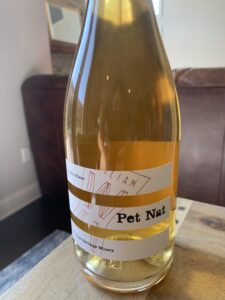
2018 is the first vintage made of this really interesting and tasty sparkling wine. Pét Nat is short for Pétillant Naturel, a very old process for making sparkling wine invented by 16th century monks in the south of France. It is a more rustic style of wine-making in which yeast is often left in the bottle rather than being filtered out, resulting in a cloudy wine with bready/yeasty flavors. This dry wine from Heritage has been gently filtered, so it is clear, but enough yeast has remained behind to add texture and flavor. The Heritage Pét Nat has aromas of honey and pear with a slight creamy texture and notes of pastry and brioche.
Unionville Vineyards 2016 Hunterdon Mistral Blanc, $26.95
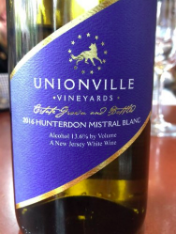
Unionville’s Mistral Blanc is a blend of 70% Viognier, 15% Marsanne and 15% Roussanne. This dry wine has nice body and a round, creamy texture with flavors of peach, pear and apricot. The rich texture is balanced by bright acidity. If you like Chardonnay, but want something slightly different, you will definitely enjoy this wine.
Beneduce Vineyard Blue 2 Blaufränkisch, $30

Based on my tastings, New Jersey produces better white wines than red wines, but Blue 2 had a full body and concentrated fruit flavors that made this red wine a stand-out. Blaufränkisch is an Austrian grape variety known to produce medium to full bodied wines with juicy, spicy fruit flavors. Beneduce describes Blue 2 as “Pinot Noir’s bigger, badder cousin” and it didn’t disappoint. This wine had nice structure and tannins with dark fruit flavors and peppery spice on the finish. It has the juiciness of a Pinot Noir, but with a richer and bolder dark fruit profile. Bigger and badder indeed.

